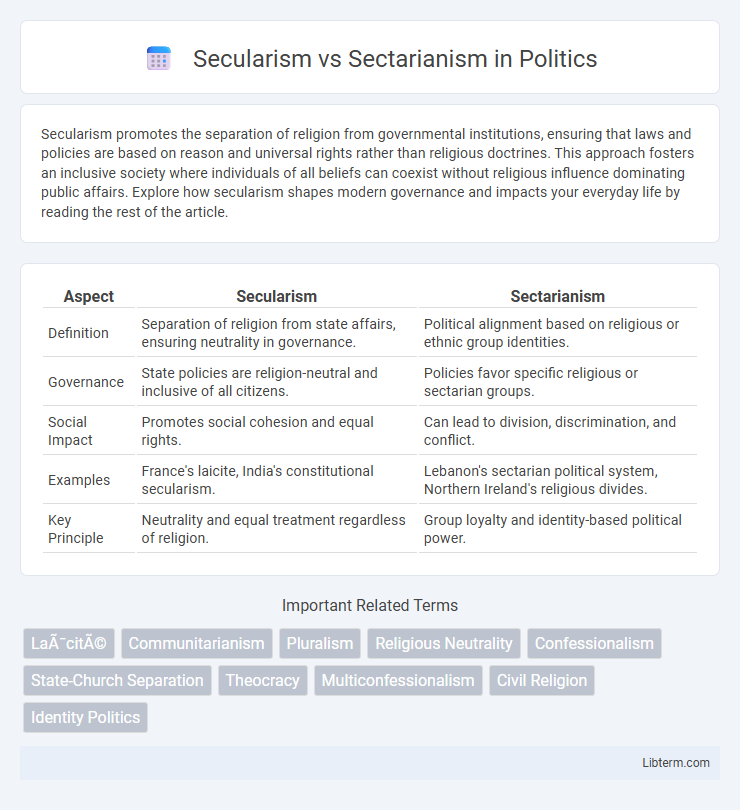Secularism promotes the separation of religion from governmental institutions, ensuring that laws and policies are based on reason and universal rights rather than religious doctrines. This approach fosters an inclusive society where individuals of all beliefs can coexist without religious influence dominating public affairs. Explore how secularism shapes modern governance and impacts your everyday life by reading the rest of the article.
Table of Comparison
| Aspect | Secularism | Sectarianism |
|---|---|---|
| Definition | Separation of religion from state affairs, ensuring neutrality in governance. | Political alignment based on religious or ethnic group identities. |
| Governance | State policies are religion-neutral and inclusive of all citizens. | Policies favor specific religious or sectarian groups. |
| Social Impact | Promotes social cohesion and equal rights. | Can lead to division, discrimination, and conflict. |
| Examples | France's laicite, India's constitutional secularism. | Lebanon's sectarian political system, Northern Ireland's religious divides. |
| Key Principle | Neutrality and equal treatment regardless of religion. | Group loyalty and identity-based political power. |
Introduction: Defining Secularism and Sectarianism
Secularism advocates for the separation of religion from governmental institutions, ensuring that state policies remain neutral toward all religious beliefs. Sectarianism involves strong allegiance to a specific religious sect, often resulting in division and conflict between different religious groups. Understanding these concepts is crucial for analyzing social cohesion and political stability in multi-religious societies.
Historical Roots and Evolution
Secularism emerged during the Enlightenment as a political principle advocating the separation of religion from state affairs to ensure individual freedoms and equality, contrasting with sectarianism, which is rooted in the division of society based on religious or ethnic loyalties. Historically, secularism developed through landmark events like the French Revolution and the establishment of constitutional democracies, while sectarianism has its origins in religious schisms and conflicts, such as the Sunni-Shia divide in Islam and Protestant-Catholic tensions in Europe. Over time, secularism evolved to promote inclusive governance and pluralism, whereas sectarianism often reinforced social fragmentation and power struggles within communities.
Key Principles of Secularism
Secularism is grounded in the key principles of separation of religion and state, ensuring that governmental institutions remain neutral and do not favor any religious group. It promotes freedom of belief and equality, protecting individuals' rights to practice their religion or abstain from religious affiliation without discrimination. By upholding these principles, secularism fosters social cohesion and prevents sectarian conflicts rooted in religious favoritism or exclusion.
Core Features of Sectarianism
Sectarianism is characterized by strong loyalty to a specific religious or ethnic group, often leading to social fragmentation and conflict. It emphasizes exclusivity, discrimination, and identity-based divisions that undermine social cohesion. Core features include in-group favoritism, out-group hostility, and the politicization of religious or sectarian identities.
Impact on Governance and Politics
Secularism fosters inclusive governance by promoting equal representation and preventing religious influence over state policies, enhancing political stability and social cohesion. Sectarianism, conversely, often leads to factionalism, discrimination, and conflict, undermining democratic processes and fueling political instability. The persistent tension between secular and sectarian forces significantly shapes legislative priorities, electoral dynamics, and governance effectiveness in pluralistic societies.
Effects on Social Cohesion and Conflict
Secularism promotes social cohesion by fostering inclusive governance and equal rights regardless of religious affiliation, reducing sectarian divisions and mitigating conflict. Sectarianism exacerbates social fragmentation by prioritizing particular religious identities, often leading to discrimination, social exclusion, and violent clashes. Empirical studies indicate that states with strong secular frameworks generally experience lower levels of sectarian violence and greater societal stability.
Role in Education and Cultural Identity
Secularism in education promotes inclusive curricula that emphasize critical thinking, scientific inquiry, and cultural diversity, fostering a unified national identity beyond religious divisions. Sectarianism in education often leads to segregated schooling systems, reinforcing religious identity and cultural differences, which can limit social cohesion and perpetuate communal biases. The role of educational policies in balancing secular and sectarian influences critically shapes cultural identity formation and intergroup relations within diverse societies.
Case Studies: Global Examples
Secularism promotes government neutrality in religious matters, exemplified by India's constitutional separation of religion and state, which aims to manage its diverse religious landscape without privileging any group. Contrastingly, sectarianism often emerges in regions like Northern Ireland, where religious identity fuels conflict between Protestant and Catholic communities, influencing political and social divisions. Another case is Lebanon, where sectarian power-sharing sustains political stability but also entrenches divisions and complicates governance.
Challenges and Criticisms
Secularism faces challenges in diverse societies where religious identities strongly influence social and political dynamics, often leading to accusations of suppressing faith-based values. Sectarianism exacerbates divisions by prioritizing sect or community interests over national unity, resulting in conflicts and political instability. Critics argue that secularism can sometimes inadvertently marginalize religious communities, while sectarianism undermines social cohesion by fostering exclusion and hostility.
Conclusion: Pathways Toward Tolerance
Promoting secularism fosters inclusive governance and equal rights, reducing sectarian divides by emphasizing common citizenship over religious identity. Education that highlights diversity and critical thinking cultivates mutual respect and counters sectarian prejudices. Sustainable tolerance emerges from institutional frameworks that uphold freedom of belief while preventing religious discrimination.
Secularism Infographic

 libterm.com
libterm.com